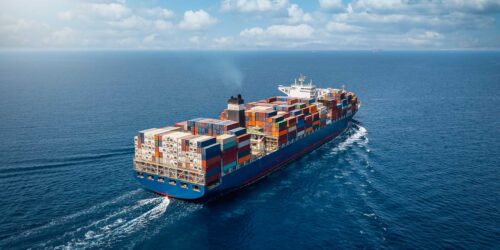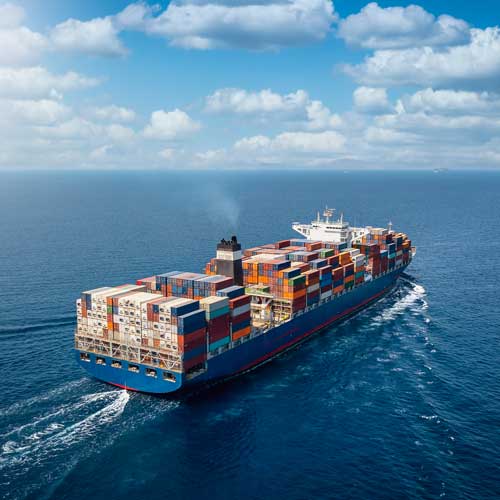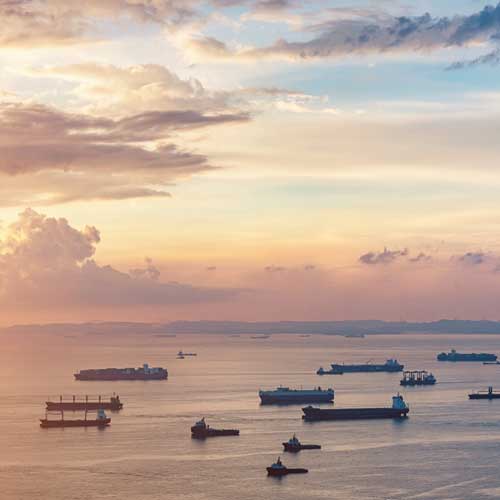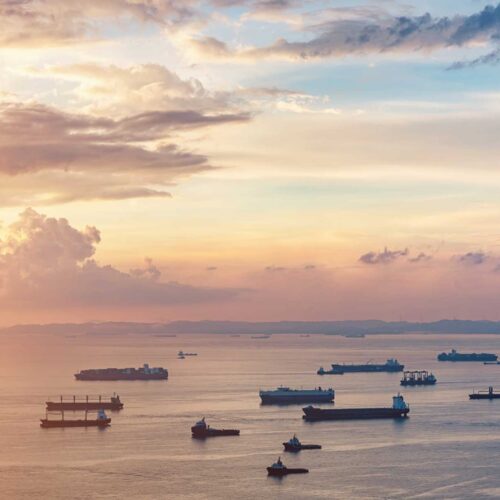
Maritime Decarbonization
Charting a Course to Shipping Decarbonization
Shipping is the backbone of international trade and the global economy, responsible for transporting over 80% of the world’s goods. It is also responsible for about 3% of global GHG emissions, with ships burning around 300 million tons per year of fossil fuels. Emissions will rise significantly by 2050 if radical changes are not made to global shipping’s fuels and propulsion technologies.
The inherent scale and complexity of international shipping create additional hurdles to accelerate the pace of decarbonization. Shipping is heavily reliant on the dirtiest of all fuels: heavy fuel oil, which has a comparative low cost that doesn’t take into account its impact on the ecosystem and the growing transition risks. Efforts to promote the adoption of cleaner technologies, such as low-emission fuels, require the mobilization and coordination of a diverse set of players, from local ports and policymakers to transnational vessel owners and operators, fuel producers, and cargo owners. Further, shipping’s cross-border nature presents challenges to nations and states working to design and enforce regulations that encourage transparent, reliant, and verified interventions to reduce emissions and other environmental impacts.
In response to the growing emissions projections of the shipping sector, in 2023, member states of the International Maritime Organization (IMO) unanimously set a target for net-zero emissions by 2050 and pledged to increase the uptake of zero or near-zero GHG emission fuels and/or energy sources to at least 5% of shipping’s energy use, striving for 10%, by 2030.
Hitting these 2030 and 2050 targets will require a whole host of creative solutions for jumpstarting new levels of coordination and investment across the shipping landscape. RMI is working with organizations across geographies and industries to build upon the momentum of IMO targets and accelerate efforts to unlock a clean, prosperous, zero-carbon future for the maritime sector.
Our Theory of Change
By collaborating closely with key stakeholders across the shipping value chain, we aim to drive the decarbonization of global shipping through systems thinking and market-based interventions. Our team works around the globe to create systemic changes that reduce global shipping emissions, support cleaner fuel adoption, and ensure an inclusive, sustainable future for the industry as well as opportunities for emerging economies to participate in a decarbonized maritime economy.
Our theory of change is deployed through the work of our four pillars:

Green Shipping Corridors

Maritime Port Fuel Supply

Book and Claim: Katalist

IMO Policy and Diplomacy

Green Shipping Corridors
RMI is accelerating the deployment of vessels running on zero-emission fuels this decade through the development of green shipping corridors. These are shipping routes between two major port hubs on which ships can travel with low-emissions fuels, principally green hydrogen and its derivatives ammonia and methanol. Alongside the Mærsk Mc-Kinney Møller Center for Zero Carbon Shipping, RMI released a handbook to help ports, shipping companies, fuel producers, financiers, and governments start developing green shipping corridors. With an eye toward Europe, RMI explored the role that green shipping corridors could play as the region looks to increase its supply of green hydrogen, and joined the Transatlantic Clean Hydrogen Trade Coalition (H2TC) in its mission to encourage and enable the first shipment of clean hydrogen from the United States to Europe by 2026. Expanding to other geographies, RMI conducted a feasibility study on establishing a dry bulk trade green shipping corridor between Louisiana and Japan.

Maritime Port Fuel Supply
A stable and accessible fuel supply is essential to encourage ship owners to invest in vessels that run on low-emissions fuels. Similarly, fuel producers and ports require clear signals of growing demand to justify investment in low-carbon fuel production and bunkering infrastructure. RMI is addressing this supply-demand gap by enhancing the maritime sector’s understanding of green ammonia and methanol cost and trade dynamics. The port fuel supply analysis is being used by ports and bunkering companies to develop sourcing strategies, by fuel producers to identify ports to target for business development, and by policymakers to understand and leverage economic opportunities associated with participation in the green maritime fuel economy. As part of this work, RMI, through strategic collaborations with organizations like the Global Maritime Forum and initiatives like Mission Innovation, has outlined strategies for ports to become first movers in providing green methanol and ammonia bunkering. In addition, we support the development of two zero-emission maritime fuel export hubs in the Global South by providing techno-economic analysis and stakeholder engagement capabilities.

Maritime Book and Claim - Katalist
Cargo owners are willing to pay more for verified, zero-emission shipping services, but are struggling to access them at the scale and timeline required to meet their climate ambitions and commitments. To enable cargo owners to signal their demand for transparent and credible emission reductions, supporting frontrunners in the adoption of zero-emissions shipping fuels, RMI and the Mærsk Mc-Kinney Møller Center for Zero Carbon Shipping (MMMCZCS) designed Katalist, a Book and Claim registry built specifically for the operational and reporting requirements of global shipping. By decoupling fuel attributes from the physical value chain, book and claim enables transactions of the fuel’s environmental attributes and its corresponding transport activity, ensuring that information is verified, reflects life cycle emissions, and enables cargo owners to influence the pace at which zero-emissions fuels are being deployed and adopted. The registry has been developed and tested with 29 organizations across the transport value chain, including shipping companies, freight forwarders, and cargo owners. In 2024, the Zero Emission Maritime Buyers Alliance (ZEMBA) announced that they will use Katalist to execute its first tender, beginning in 2025.

IMO Policy and Diplomacy Engagement
RMI is building on its existing relationships with leading green hydrogen producers and maritime stakeholders to garner momentum and showcase to policy makers that industry is ready and willing to invest in e-fuels if the right regulatory framework is in place. Meeting the IMO’s decarbonization goals is only possible through the use of Scalable Zero Emissions Fuels (SZEFs) such as hydrogen-derived methanol and ammonia. Acknowledging this, RMI, the University College London, and the UN High Level Champions have established joint commitments to define ambitious, actionable interventions and investments needed to support the adoption of hydrogen-derived fuels and achieve zero emissions by 2050. RMI also facilitates a Green Fuels For Green Shipping network, hosting a series of roundtables to update industry on the status of IMO negotiations and various policy measures to support their business strategies of first movers in the e-fuel ecosystem.
Latest Resources
The Time Is Now for Zero-Emissions Cargo Handling Equipment at America’s Busiest Cargo Ports
The Ports of Los Angeles and Long Beach handle nearly 40 percent of US shipping container traffic; decarbonizing the equipment that handles these containers needs to begin now.
Jumpstarting Decarbonization of the Maritime Shipping Sector
Shipping has few ways to achieve the required emissions reductions in the timeframe proposed by the Intergovernmental Panel on Climate Change (IPCC).
Will Shipping Steam toward Decarbonization?
Maritime shipping, ordinarily something of an “invisible industry,” has been a hot topic ahead of this fall’s UN Climate Change Conference (COP26) in Glasgow, Scotland.
In the Media
Financial Times
Green shipping: mooted carbon tax set to make waves
The Maritime Executive
New Maritime Book & Claim System Strengthens Case for Green Shipping
